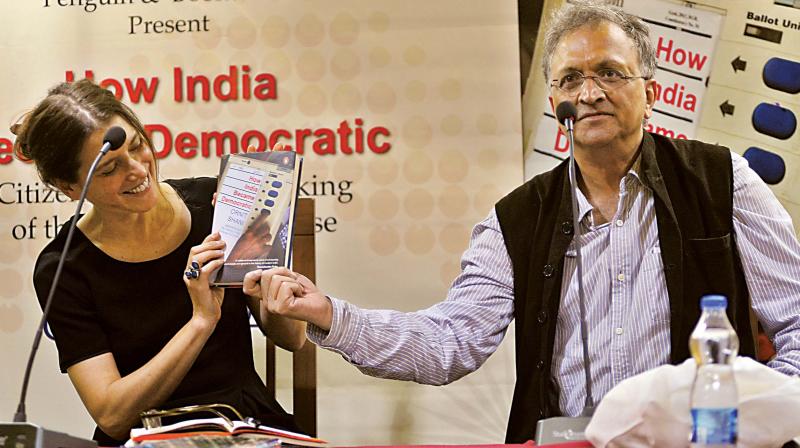Electoral process not a colonial legacy: Book
How India Became Democratic deals with the building of momentous history of the founding of electoral democracy in India.

Bengaluru: One of the most cited achievements of Indian democracy is the holding of free and fair elections. Ms Ornit Shani’s book, How India Became Democratic deals with the building of momentous history of the founding of electoral democracy in India.
Well, the writing of the book started with a question - How India prepared the first electoral list? On not getting the satisfactory answer, Ms Shani delved into the archives kept in the basement of the office of Election Commission of India.
Historian Ramachandra Guha remarked that historians would envy the rich sources the author has referred to. "The letters of Mahatma Gandhi in Israel and the correspondence of prospective voters were never used before by any historian and this is a biggest achievement of an historian if they get their hands at source which has never been used before," the historian said. One of the most striking features of the book is the adoption of Universal Adult Franchise in April 1947, but the mammoth task to turn the citizens into voters went through the awe-inspiring process. “There were 552 princely states along with 18 million refugees in the subcontinent. Over 85% of the prospective voters had no experience of voting and the illiteracy was high. Fifty per cent of the women were recognized as individuals, but ‘as a wife of’ or ‘a widow of’,” Ms Shani said while emphasizing on the point that Universal Adult Franchise was not the colonial legacy that India inherited, as it is widely believed. But behind it there is a huge story of the geniuses of people who made it possible.
In a lighter vein, Mr Guha remarked that unlike today’s books, netas and babus (Politicians and bureaucrats) come out very well. The reason Ms Shani gave was that the bureaucrat’s commitment to equality was so high that in one of the instances, a collector of Bombay wrote to the state chief secretary whether vagrants, helpers etc who slept on the footpath or streets should be included in the electoral list.
“The Constituent Assembly Secretariat was so responsive to every letter and used to take maximum two weeks to respond,” she elaborated.
Taking a jibe at Rashtriya Swayamsewak Sangh (RSS) which said that Jawaharlal Nehru would regret Universal Franchise, Guha remarked that the political will and, unlike today, the leader's respect towards organizations and its people made India’s democracy robust.
Ms Shani has revealed that a sequel to the book on the social history of India’s first election is her next project.

